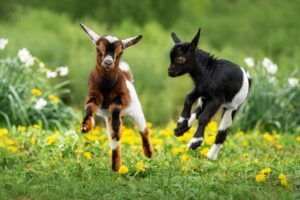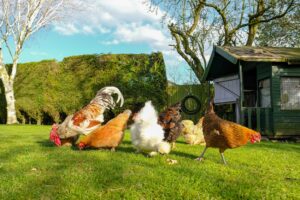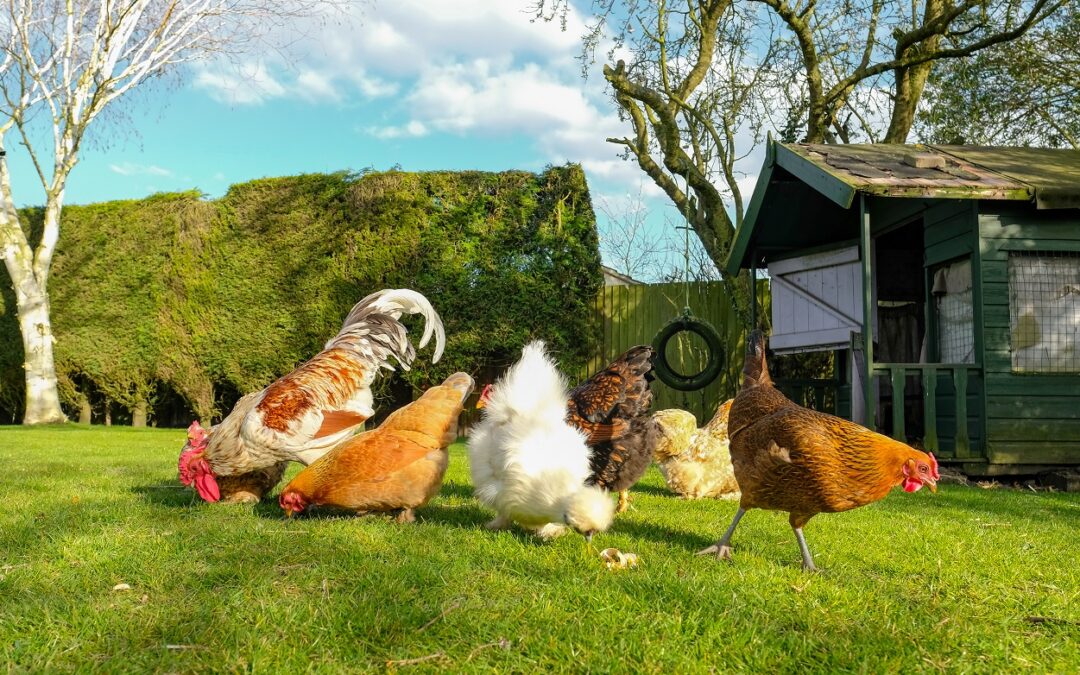The benefit of small livestock on your homestead
 Are you looking for a way to add some more life to your homestead? Keeping small livestock can be a great way to do that! Not only can they add a bit of fun and excitement to your property, but they can also be beneficial in a variety of ways. From providing food to keeping your garden healthy, small livestock can really make a difference on your homestead. In this article, we’ll explore the benefits of keeping small livestock on your property.
Are you looking for a way to add some more life to your homestead? Keeping small livestock can be a great way to do that! Not only can they add a bit of fun and excitement to your property, but they can also be beneficial in a variety of ways. From providing food to keeping your garden healthy, small livestock can really make a difference on your homestead. In this article, we’ll explore the benefits of keeping small livestock on your property.
Why Small Livestock?
Small livestock can be a great asset to any homestead. They provide a sustainable source of food, fur, and even manure for use in gardens and fields. They can also be a great source of companionship and entertainment. Raising small livestock can be a rewarding experience, and it can be a great way to teach children responsibility and the value of hard work. With a little bit of effort and planning, small livestock can be a great addition to any homestead.
A. Definition of “Small Livestock”
Small livestock refers to animals that are bred and raised for their meat, milk, eggs, wool, and other products. These animals are usually smaller in size than traditional livestock (such as cows, horses, and pigs) and include animals such as rabbits, chickens, goats, sheep, and ducks. Small livestock can provide numerous benefits to a homestead, such as providing a source of income or food. Additionally, they can help to reduce the workload of the homestead, from providing manure for composting to controlling pests. Furthermore, they can provide companionship and entertainment, giving the homestead a more home-like atmosphere. Finally, small livestock can provide educational opportunities for the homesteaders and their children, teaching them about animal husbandry, food production, and the environment.
What are Some Benefits of Keeping Small Livestock
Small livestock can be a great benefit to your homestead. They can provide a steady source of food, such as eggs and meat, as well as natural fertilizer for your garden. They can also provide companionship and entertainment while their presence can be a deterrent to predators. Small livestock can also be used to provide a source of income through the sale of eggs, meat, and wool. Additionally, chickens can be used to help control pests in your garden, as they will eat anything from insects to weeds. Small livestock can also provide entertainment and education, such as watching chicks hatch or observing the behaviors of different species. Finally, having small livestock can be a great way to teach children responsibility and the value of hard work.
What About Nutritional Benefits of Small Livestock?
 Small livestock such as chickens, goats, sheep, and rabbits are all great additions to a homestead, not only for their ability to provide food, but also for the many nutritional benefits they can bring. Chickens and eggs provide a source of high-quality protein and essential vitamins and minerals. Goats can be a great source of dairy products such as milk, cheese, and yogurt, all of which are very nutritious and can be used in many different recipes. Sheep are a great source of meat, and their wool can be used to make clothing and blankets. Rabbits are also great sources of both meat and fur. All of these small livestock can provide an invaluable source of nutrition to a homestead, and can be a great way to diversify the types of food that are available.
Small livestock such as chickens, goats, sheep, and rabbits are all great additions to a homestead, not only for their ability to provide food, but also for the many nutritional benefits they can bring. Chickens and eggs provide a source of high-quality protein and essential vitamins and minerals. Goats can be a great source of dairy products such as milk, cheese, and yogurt, all of which are very nutritious and can be used in many different recipes. Sheep are a great source of meat, and their wool can be used to make clothing and blankets. Rabbits are also great sources of both meat and fur. All of these small livestock can provide an invaluable source of nutrition to a homestead, and can be a great way to diversify the types of food that are available.
A. Nutrient-Rich Foods
On a homestead, nutrient-rich foods are essential for the health of both livestock and humans. Small livestock such as chickens, sheep, and goats can provide nutrient-rich foods in the form of eggs, milk, and meat. Eggs are high in essential fatty acids, vitamins, and minerals and can be a great source of protein for both humans and livestock. Milk from small livestock is a great source of calcium, phosphorus, vitamins, and fat, and is an excellent dietary supplement for humans and animals. Meat from these animals is also a great source of protein, iron, zinc, and other important vitamins and minerals. These nutrient-rich foods can help to ensure that your homestead is well-nourished, healthy, and productive.
B. Low Cost
The benefit of small livestock on your homestead is the potential for low cost. Small animals require much less space and equipment than large animals, meaning you can raise them with minimal investment. They also eat less feed and are easier to manage, so you will save money on feed costs. In addition, many small livestock breeds are very hardy and require less veterinary care, so you can save even more money on vet bills. Finally, if you decide to breed your small livestock, you can often sell the offspring for a profit, making small livestock a great way to generate income.
What are the Environmental Benefits of Having Small Livestock
 The environmental benefits of small livestock on a homestead are numerous. Small livestock produce fewer emissions than larger animals, leading to reduced carbon dioxide and other greenhouse gases in the atmosphere. They are also more efficient than larger animals at converting feed into protein, meaning they generate fewer waste products and require less land to raise. Additionally, their manure is very rich in nitrogen and other nutrients, making it an excellent source of fertilizer for gardens, crops, and other plants. This reduces the need for chemical fertilizers, which can have detrimental effects on the environment. Finally, since they require less land and resources than larger animals, they can help reduce the pressure of overgrazing and deforestation.
The environmental benefits of small livestock on a homestead are numerous. Small livestock produce fewer emissions than larger animals, leading to reduced carbon dioxide and other greenhouse gases in the atmosphere. They are also more efficient than larger animals at converting feed into protein, meaning they generate fewer waste products and require less land to raise. Additionally, their manure is very rich in nitrogen and other nutrients, making it an excellent source of fertilizer for gardens, crops, and other plants. This reduces the need for chemical fertilizers, which can have detrimental effects on the environment. Finally, since they require less land and resources than larger animals, they can help reduce the pressure of overgrazing and deforestation.
A. Natural Fertilizer
A natural fertilizer is one of the best ways to keep your homestead healthy and productive. Using natural fertilizers, such as compost and manure, can provide much-needed nutrients and minerals to your soil, helping your crops and plants to thrive. Small livestock, such as goats, chickens, and sheep, are great for providing natural fertilizer for your homestead. Their manure can be collected and used as a natural fertilizer for your garden or fields, helping to improve the soil quality over time. Additionally, small livestock can help to keep weeds and pests away from your crops, reducing the need for chemical-based pest control. In addition to providing natural fertilizer, small livestock can also provide a source of meat, eggs, and milk for your homestead, making them a valuable asset.
B. Natural Weed Control
The use of small livestock for natural weed control on a homestead is a great way to optimize the use of land and resources. When used in conjunction with other natural methods, such as crop rotation and cover cropping, this can serve as an effective form of weed control. This system works by allowing the animals to graze on the weeds in the area and by their hooves and hoof action tramping down the weeds. This results in the weeds being unable to take root and spread. In addition to this, the manure produced by the animals can provide an additional layer of fertility to the soil, along with other beneficial minerals. Furthermore, this method of weed control is much more cost-effective than the use of chemical treatments or manual weeding. With the use of small livestock, homesteaders can create a sustainable, natural system of weed control that can benefit the entire ecosystem.
Small Livestock Provide Economic Benefits to a Homestead
Small livestock has significant economic benefits for your homestead. Not only do they provide a continuous source of income, they also offer a way to reduce the cost of purchasing food. For example, raising chickens for eggs and meat can significantly reduce the cost of buying poultry products from the grocery store. In addition, small livestock can also be used to generate additional income. For example, selling eggs or meat from chickens, goats, and other small animals can provide a steady stream of income to help supplement other revenue streams. Finally, small livestock can also provide valuable manure to help with gardening and landscaping. Manure from animals can be used to fertilize the soil and help your plants grow while saving money on purchasing expensive fertilizers. Overall, small livestock can provide significant economic benefits to your homestead.
A. Income Generation
Small livestock can be a great way to generate income on your homestead. Keeping a few animals such as goats, chickens, and rabbits can provide a steady source of additional income. Goats can produce milk, cheese, and other dairy products that can be sold at local farmers markets or online. Chickens can provide eggs and meat that can be sold, and rabbits can provide both meat and fur that can be sold. Additionally, many of the items needed to care for small livestock can be produced on your homestead as well, such as hay and animal feed, reducing your costs and increasing your profits. If you have the space and resources, small livestock can be an excellent way to supplement your income on your homestead.
B. Low Investment
Small livestock can be a great way to add to the homestead, and they come with the benefit of low investment. This low investment can be seen in the initial cost of the animals themselves, as small livestock tend to be cheaper than larger animals. Additionally, you can save money on housing, as you may be able to use existing structures or build something relatively inexpensive. Small livestock also require less feed than larger animals, helping to lower the costs of upkeep. Finally, you don’t need to invest as heavily in labor, as small livestock are less labor-intensive than larger animals. This can help to lower the overall investment for the homestead.
Some of the Social Benefits of Small Livestock
Small livestock can provide a variety of social benefits when kept on a homestead. For starters, they can provide companionship and help reduce feelings of loneliness. Animals can be a source of comfort and joy, and having them around can be a great source of entertainment. Additionally, animals can give a sense of purpose and responsibility to their owners, providing a chance to practice kindness and care for a living creature. Small livestock can also help teach children about responsibility, as taking care of the animals can be given as a task. Furthermore, having small livestock on a property can help to foster community connections, as people are more likely to visit and talk when there are animals around. Finally, small livestock can provide a great food source, both for their owners, as well as for trade or sale.
A. Companionship
A. Companionship is one of the most important benefits of small livestock on your homestead. Animals such as chickens, goats, sheep, and pigs can provide a great deal of companionship for their human caretakers. Not only do these animals offer unconditional love and loyalty, but they also provide a sense of responsibility, connection to nature, and an emotional outlet for those who care for them. Moreover, these animals can help bring family and friends together for shared experiences, such as feeding and caring for the animals. Small livestock can also provide an increased sense of safety, as they can alert their owners to potential intruders and disturbances. Furthermore, having animals around can help to reduce stress and anxiety and can even help to reduce blood pressure in their owners. All in all, the companionship and emotional support of small livestock can be an invaluable asset to any homestead.
B. Stress Relief
Small livestock can provide a great source of stress relief on your homestead. Caring for animals gives you purpose and a sense of accomplishment, and interacting with animals can help to reduce anxiety and stress. The act of caring for an animal can provide a distraction from the worries of everyday life, which can help to provide a sense of peace and contentment. The presence of animals can also help to reduce loneliness, as they can be excellent companions that provide unconditional love and support. Furthermore, animals can help to reduce stress by providing physical activity, giving you something to focus on, and providing a sense of responsibility.
Conclusion …
In conclusion, small livestock can be a great addition to your homestead. They provide a source of food and can also help to fertilize soil and provide additional income. Small livestock are easy to care for and require less space than their larger counterparts. Additionally, they can help to reduce feed costs, provide companionship, and provide an opportunity to teach children about responsibility and animal care. With proper care, small livestock can provide a variety of benefits to your homestead.



